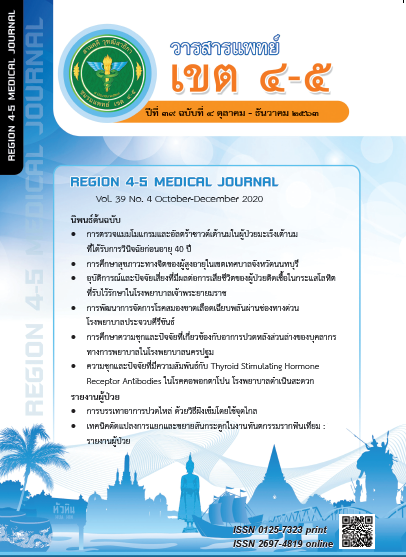ความชุกและปัจจัยที่มีความสัมพันธ์กับ Thyroid Stimulating Hormone Receptor Antibodies ในโรคคอพอกตาโปน โรงพยาบาลดำเนินสะดวก
คำสำคัญ:
Thyroid stimulating hormone receptor antibodies (TRAb), โรคคอพอกตาโปน, ยาต้านไทรอยด์ฮอร์โมนบทคัดย่อ
บทคัดย่อ
วัตถุประสงค์: เพื่อศึกษาความชุกของการตรวจพบ thyroid stimulating hormone receptor antibodies (TRAb) ก่อนการรักษาด้วยยาต้านไทรอยด์ และหาความสัมพันธ์ระหว่าง TRAb และปัจจัยต่างๆ ของผู้ป่วยโรคคอพอกตาโปน
วิธีการศึกษา: เป็นการวิจัยเชิงวิเคราะห์ในผู้ป่วยโรคคอพอกตาโปนจำนวนทั้งหมดที่มารับการรักษาในโรงพยาบาลดำเนินสะดวก ในช่วงเวลาตั้งแต่ กรกฎาคม พ.ศ. 2557 ถึง กรกฎาคม พ.ศ. 2563 จำนวน 162 ราย โดยผู้ป่วยที่รักษาด้วยยาต้านไทรอยด์ ตรวจเลือด TRAb ก่อนเริ่มรักษาด้วยยาต้านไทรอยด์ หาความชุกด้วยร้อยละ เปรียบเทียบปัจจัยทางคลินิกที่มีผลต่อการตรวจพบ TRAb ด้วย chi-square และ t-test independent
ผลการศึกษา: ความชุกของการตรวจพบ TRAb ที่ให้ผลเป็นบวก เท่ากับร้อยละ 45.7 เมื่อรักษาครบ 2 ปี พบว่ากลุ่มผู้ป่วยที่ TRAb เป็นลบ มีผู้ป่วยที่หายจากโรคมากกว่ากลุ่มผู้ป่วยที่ TRAb เป็นบวก อย่างมีนัยสำคัญ (p=.005) และ พบว่ากลุ่มผู้ป่วยที่ TRAb เป็นลบ มีผู้ป่วยที่กลับเป็นซ้ำน้อยกว่ากลุ่มผู้ป่วยที่ TRAb เป็นบวก อย่างมีนัยสำคัญ (p=.019) นอกจากนี้การตรวจพบ TRAb มีความสัมพันธ์กับระดับ tri-iodothyronine หรือ FT3 (p=.016) แต่ไม่พบความสัมพันธ์ระหว่างเพศ อายุของผู้ป่วย ระยะเวลาที่มีอาการ อัตราการเต้นของหัวใจ ระดับ thyroxine (FT4), anti-thyroid peroxidase และ anti-thyroglobulin กับการตรวจพบ TRAb
สรุป: การตรวจ TRAb ก่อนการรักษาในผู้ป่วยโรคคอพอกตาโปนมีประโยชน์ในการพยากรณ์โรคได้แก่ การหายของโรค และการเกิดการกำเริบซ้ำ
เอกสารอ้างอิง
1. Bahn RS. Autoimmunity and graves disease. Clin Pharmacol Ther. 2012; 91(4): 577–9. doi: 10.1038/clpt.2012.10.
2. Bartalena L. Diagnosis and management of Graves disease: a global overview. Nat Rev Endocrinol. 2013; 9(12): 724–34. doi: 10.1038/nrendo.2013.193.
3. Roti E, Braverman LE, DeGroot LJ. TSH Receptor Antibody Measurement in the Diagnosis and Management of Graves’ Disease Is Rarely Necessary. J Clin Endocrinol Metab. 1998; 83(11): 3781–4.
4. Feldt-Rasmussen U, Schleusener H, Carayon P. Meta-analysis evaluation of the impact of thyrotropin receptor antibodies on long term remission after medical therapy of Graves’ disease. J Clin Endocrinol Metab. 1994; 78(1): 98–102. doi: 10.1210/jcem.78.1.8288723.
5. Vitti P, Rago T, Chiovato L, et al. Clinical features of patients with graves’ disease undergoing remission after antithyroid drug treatment. Thyroid. 1997;7(3):369–75. doi: 10.1089/thy.1997.7.369.
6. Bluszcz GA, Bednarczuk T, Bartoszewicz Z, et al. Clinical utility of TSH receptor antibody levels in Graves’ orbitopathy: A comparison of two TSH receptor antibody immunoassays. Cent Eur J Immunol. 2018; 43(4): 405–12. doi: 10.5114/ceji.2018.80224.
7. Meena MQ. Diagnosing Graves’ Disease and Non-Graves Hyperthyroidism Using TSH Receptor Antibody Test versus Non-TSH Receptor Antibody Test Methods of Diagnosis. Open J Endocr Metab Dis. 2020; 10(02): 7–17. doi: 10.4236/ojemd.2020.102002.
8. Bell L, Hunter AL, Kyriacou A, et al. Clinical diagnosis of Graves’ or non-Graves’ hyperthyroidism compared to TSH receptor antibody test. Endocr Connect. 2018; 7(4): 504–10. doi: 10.1530/EC-18-0082.
9. American Thyroid Association. Some patients with apparent Graves’ disease do not have an autoimmune thyroid disorder. Clinical Thyroidology for the Public. 2014; 7(2): 4-5.
10. Laurberg P, Nygaard B, Andersen S, et al. Association between TSH-receptor autoimmunity, hyperthyroidism, goitre, and orbitopathy in 208 patients included in the remission induction and sustenance in graves’ disease study. J Thyroid Res. 2014; 2014: 165487. doi: 10.1155/2014/165487.
11. Shyamasunder AH, Abraham P. Measuring TSH receptor antibody to influence treatment choices in Graves’ disease. Clin Endocrinol (Oxf). 2017; 86(5): 652-7. doi: 10.1111/cen.13327.
12. Barbesino G, Tomer Y. Clinical utility of TSH receptor antibodies. J Clin Endocrinol Metab. 2013; 98(6): 2247–55.
13. Thyroid antibody levels may not predict thyroid hormone levels and risk of recurrence in older patients with Graves’ disease. Clinical Thyroidology for the Public. 2019; 12(7): 12-3.
14. Bano A, Gan E, Addison C, et al. Age May Influence the Impact of TRAbs on Thyroid Function and Relapse-Risk in Patients With Graves Disease. J Clin Endocrinol Metab. 2019; 104(5): 1378–85. doi: 10.1210/jc.2018-01738.
ดาวน์โหลด
เผยแพร่แล้ว
รูปแบบการอ้างอิง
ฉบับ
ประเภทบทความ
สัญญาอนุญาต
ลิขสิทธิ์บทความเป็นของผู้เขียนบทความ แต่หากผลงานของท่านได้รับการพิจารณาตีพิมพ์ลงวารสารแพทย์เขต 4-5 จะคงไว้ซึ่งสิทธิ์ในการตีพิมพ์ครั้งแรกด้วยเหตุที่บทความจะปรากฎในวารสารที่เข้าถึงได้ จึงอนุญาตให้นำบทความในวารสารไปใช้ประโยชน์ได้ในเชิงวิชาการโดยจำเป็นต้องมีการอ้างอิงถึงชื่อวารสารอย่างถูกต้อง แต่ไม่อนุญาตให้นำไปใช้ในเชิงพาณิชย์




